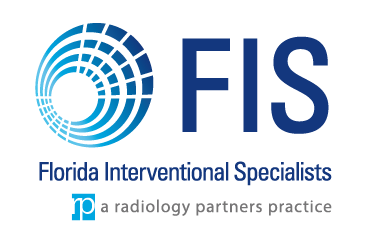Transjugular Intrahepatic Portosystemic Shunt (TIPS)
Transjugular Intrahepatic Portosystemic Shunt (TIPS), is a shunt (tube) placed between the portal vein, which carries blood from the intestines/spleen and to the liver, and the hepatic vein which carries blood from the liver to the vena cava and the heart.
TIPS are performed primarily in patients with cirrhosis in which the scar tissue in the liver causes partial blockage of flow of blood from the portal vein through the liver to the hepatic vein. The blockage increases the pressure in the portal vein, which is called portal hypertension. As a result of the increase in pressure, portal blood flow bypasses the liver and is diverted to smaller veins that flow around the abdominal wall, stomach and esophagus. These new veins which divert the flow away from the liver are called varices. Varices that form in the stomach and esophagus may rupture and bleed. Portal hypertension can also cause fluid to leak out of the liver and into the abdomen or right chest around the lung. Fluid that collects in the abdomen is called ascites, and when it occurs in the chest is termed an effusion. Although in different spaces, the cause of the fluid build-up is leakage of fluid out the liver caused by portal hypertension.
The TIPS procedure is performed through small incision in the right side of the neck through the Internal Jugular vein, the largest vein in the neck. Under x-ray guidance a stent (metal tube/shunt) is placed from the hepatic vein to the portal vein. This allows the blood flow to return to the heart without passing through the scarred liver tissue and lowers the build-up of blood and portal hypertension. By lowering the pressure in the portal veins and varices, there is decreased risk of bleeding and decreased ascites/fluid build-up in the chest and abdomen.
Although very effective for the treatment of portal hypertension and ascites, the procedure does contain risks. The major risks are caused by the non-anatomic diversion of the portal flow. The shunt increases the blood that reaches the brain that has not been cleaned by the liver, which can cause a type of confusion called “hepatic encephalopathy”. Fortunately, there are medications that can control hepatic encephalopathy if taken regularly. Placement of the TIPS can also make the liver slightly worse as the blood flow is now diverted away from the organ. This is most concerning for patients with severe liver disease. During evaluation for TIPS, review of the patient’s blood and heart tests, overall health and risks of encephalopathy are used to determine if patients are safe candidates. Occasionally, patients that have liver disease too advanced for treatment with TIPS are referred to the liver transplant surgery service at TGH. As the liver transplant cures the cirrhosis and the portal hypertension together, it is the preferred procedure in patients with severe liver dysfunction.

THE SERVICES LISTED ON THIS WEBSITE ARE FOR GENERAL INFORMATION PURPOSES ONLY AND DO NOT INCLUDE ALL SERVICES OF FLORIDA INTERVENTIONAL SPECIALISTS. WHILE WE STRIVE TO KEEP THE INFORMATION UP TO DATE AND CORRECT, WE MAKE NO REPRESENTATIONS OR WARRANTIES OF ANY KIND, EXPRESS OR IMPLIED, ABOUT THE CONTENT, COMPLETENESS, ACCURACY, RELIABILITY, LEGALITY, SUITABILITY OR AVAILABILITY, WITH RESPECT TO THE SERVICES CONTAINED ON THIS WEBSITE.

